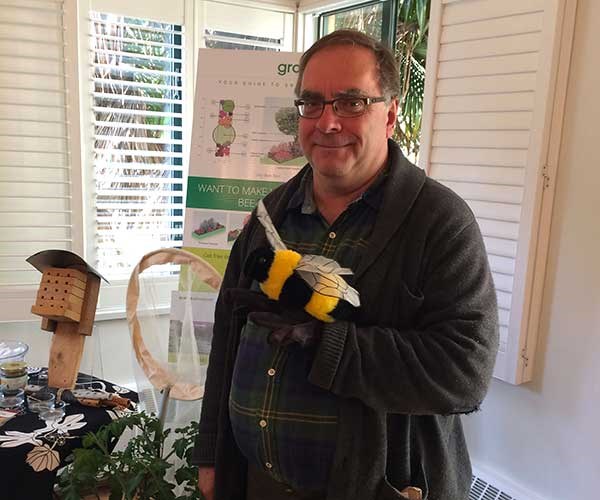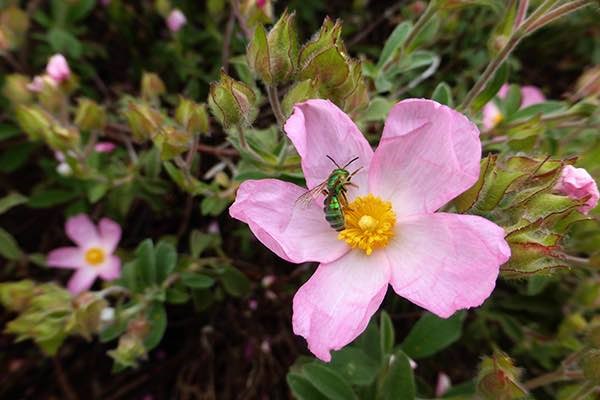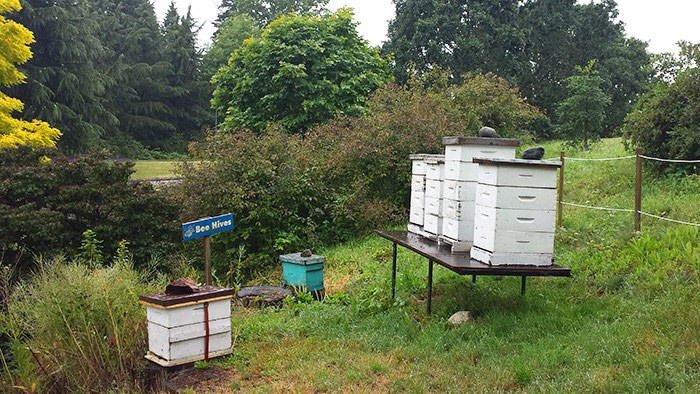By Matias Taylor
The level of biodiversity at UBC Botanical Garden is staggering—over ten different gardens with more than 120,000 different plants representing more than 6000 taxa—but the Garden isn’t just home to a wide variety of plant life; it’s also home to animal life, from large birds like Canada geese to tiny pollinators. Bees are within this latter category, and form an important part of both the Garden’s fauna and its research goal to create replicable sustainability practices. At the forefront of the Garden’s bee-related activities is Certified Beemaster and beekeeper Brian Campbell, who has been a beekeeper for over 20 years and is heavily involved in bee-related education and conservation activities in the Lower Mainland,from teaching sustainable urban keepeeping at Langara College to being part of Border Free Bees, a joint research and public art initiative of Emily Carr University, Simon Fraser University and UBC Okanagan. Brian is also a Product Development Manager at West Coast Seeds, overseeing plant trials and conducting research on new horticultural plant introductions, as well as a All America Selection vegetable judge, reviewing and commenting on new plant varieties and awarding prizes for merit before they are introduced into the marketplace.

UBC Botanical Garden Beeologist in Residence Brian Campbell
“A Beeologist studies bees and their interactions in the world—it is an invented word that has a flexbile meaning” explains Brian. “My interpretation is a Beeologist is someone who studies bees and applies that knowledge to effect positive change to conserve and protect these valuable animals.” Brian stresses this value, stating that bees “are a key component to a healthy and diverse ecosystem”, and that, through their pollination, bees have played an essential role in the development of culture and civilization. “When we think of bees generally we don’t think of the story of human culture. When we think of travelling to Greece or to Mexico we don't think about the vegetables, fruits, herbs, textile dyes, herbal medicines and beverages bees are responsible for pollinating. When we think of the flavours, smells, colours and tastes of a place or culture we don't think about the bees that made this possible. Bees ask very little of us and offer much more in return.” There are over 56 species of bees at UBC Botanical Garden, and Brian credits it with being a fantastic environment for biodiversity since the variety of plants sustain pollinators, as well an ideal place to study them. “The importance of the garden to bees is it offers an opportunity to study them; their population dynamics, to understand what the garden is providing for them and to learn how better to conserve and keep them well into the future.”

A pollinator and Cistus x lenis ‘Grayswood Pink’ at UBC Botanical Garden
Brian’s main project as part of his role is the development of a ‘Pollinator Plan’ for the Garden. “I will share my knowledge and experience of bees by advising on the creation of a pollinator friendly demonstration garden, consulting with staff on best horticultural practices for bee conservation, and identify plants that are pollinator friendly” he explains. This knowledge will then be applied to the Grow Green project, Metro Vancouver and UBC Botanical Garden’s guide to eco-friendly gardens, and Brian will also make recommendations on how to assess native bee populations, setting up long-term bee research at the Garden, and engaging community networks and stakeholders involved with pollinator research, with the end goal of making the ‘Pollinator Plan’ a model for future pollinator conservation planning.
For those wanting to help make their gardens pollinator-friendly, Brian recommends planting more flowers—“If you are concerned about the decline in bees and other pollinators, plant a garden”. Brian also challenges the public to think differently about other pollinators that do not receive as much attention as bees, such as wasps, which he also singles out as important pollinators. "We tend to think of bees as being the good guys and wasps as worthy of eradication. The decline in bee populations is almost assuredly paralleled in wasp populations" he explains. "I know many people have negative associations with Yellow Jackets, for example, but did you know that during their colony cycle from spring to summer, a single Yellow Jacket colony will eat as much as 2.5 kilos of insects? We are talking about a lot of pest insects being removed from our roses and peonies free of charge."

The beehives at UBC Botanical Garden
Brian will be the Garden’s Beeologist in Residence for the next two years, where he will continue to develop pollinator-friendly gardening practices and help tend to the Garden’s bees. UBC Botanical Garden’s beehives are located at the edge of the Carolinian forest, but the tiny insects themselves can be found all throughout the Garden, busily working away as they help keep thousands of plants alive and healthy.


